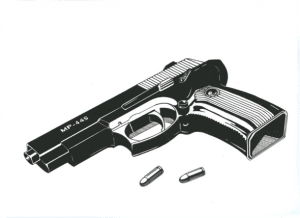Is it a Crime to Carry a Concealed Weapon?

Carrying a concealed weapon refers to the practice of carrying a handgun or other weapon in public in a concealed or hidden manner. The weapon can be hidden in one’s person or in close proximity. Any object can be defined as a weapon based on the circumstances. A baseball bat in a car parked near a baseball field where a team is practising is non-threatening and acceptable. However, the scenario changes if the car with the baseball bat is parked near an expected confrontation of hostile parties.
If you are charged with a weapons-related offence, do not plead guilty before you consult with one of our Toronto defence lawyers at Pyzer Criminal Lawyers. We have successfully defended numerous cases involving weapons, including carrying a concealed weapon, possession of a weapon for a dangerous purpose, possession of a prohibited or restricted weapon, and assault with a weapon. Our firm has extensive experience in this area of law.
Understanding Charges for Carrying Concealed Weapons
Section 90 of the Criminal Code identifies the offence of carrying a concealed weapon. According to it, every person who carries a weapon, a prohibited device, or any prohibited ammunition concealed, commits an offence unless the person is authorised under the Firearms Act to carry it concealed.
Punishment
The punishment for committing an offence is clearly defined. The individual could be guilty of an indictable offence and liable to imprisonment for a term not exceeding five years or, alternatively, can be guilty of an offence punishable on summary conviction.
Definition and Context of a Weapon
Almost any object can be converted into a weapon depending on the intention of the person who carries it and the context of its possession. A baseball bat that is on the floor in the back seat of a car may be one thing when the car is parked near a baseball diamond on a sunny day and something entirely different when the car is parked at the scene of an anticipated confrontation between hostile parties. A machete or ceremonial dagger may make for a beautiful wall decoration but it assumes a different quality when it is carried in a concealed manner into a tavern.
Authorization to Carry Under Section 20 of the Firearms Act
An individual is permitted to carry a concealed weapon by obtaining an Authorization to Carry under Section 20 of the Firearms Act. This applies to an individual who holds a licence authorising the individual to possess restricted firearms or handguns. The individual may be authorised to possess a restricted firearm or handgun at a place other than where it is authorised to be possessed under certain circumstances. These circumstances could be a need to protect the life of that individual or of others, or when the weapon is required for use in the individual’s lawful profession or occupation.
Authorizations to Carry Restricted Firearms and Certain Handguns Regulations
Authorization to Carry would be issued in two situations: firstly, when an individual needs a handgun to protect their life or the life of others, and secondly, if an individual’s profession necessitates it. The further criteria for needing restricted firearms as specified in the Authorizations to Carry Restricted Firearms and Certain Handguns Regulations, under sections 2 and 3 of the Firearms Act, are outlined as follows.
Protection of Life
For the ‘Protection of Life,’ an individual needs restricted firearms or prohibited handguns when the life of that individual, or other individuals, is under immediate threat from one or multiple individuals, when police protection is deemed insufficient, and when possession of a restricted firearm or prohibited handgun can be reasonably validated for protection from death or grievous bodily harm.
Lawful Profession or Occupation
For situations related to ‘Lawful Profession or Occupation,’ an individual requires restricted firearms or prohibited handguns when their primary activity involves the management, transportation, or protection of cash, negotiable instruments, or other goods of substantial value, requiring firearms for protection during these activities. Other conditions include when the individual works in a remote wilderness area and requires firearms for protection against wild animals, or when the individual is licensed to trap in a province according to provincial laws.
Explanation of Prohibited Weapons
You’ve probably heard the legal principle, “Ignorance of the law is no excuse.” In the realm of “prohibited weapons,” this principle is very much alive. Many individuals do not realise that the possession of certain objects is illegal. Knives that open by centrifugal force (switchblades), tasers, brass knuckles, pepper spray, and martial arts nunchucks sticks are all illegal “prohibited weapons.” Possession of any of these items is a criminal offence.
Impact of a Concealed Weapons Offence on an Individual
A concealed weapons offence record can have a significant impact on an individual, such as hindering employment opportunities or incidents involving the police. A criminal record with an entry for a weapons offence can cause very serious prejudice to an individual, whether the individual is looking for a job or merely has some otherwise insignificant contact with the police.
Contact an Experienced Criminal Lawyer Today
Call us at 416-658-1818 for a free case evaluation immediately if you have been charged with a weapons-related offence, as we can advise you of your options. Our experienced lawyers at Pyzer Criminal Lawyers will fight for your rights, raise every possible and realistic defence, and challenge the allegations and evidence under the Canadian Charter of Rights and Freedoms to ensure the best possible outcome for your case.

Jonathan Pyzer, B.A., L.L.B., is an experienced criminal defence lawyer and distinguished alumnus of McGill University and the University of Western Ontario. As the founder of Pyzer Criminal Lawyers, he brings over two decades of experience to his practice, having successfully represented hundreds of clients facing criminal charges throughout Toronto.




